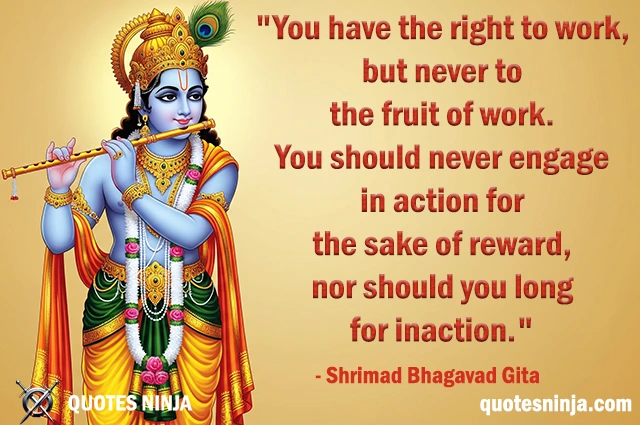
Wisdom Quote: “You have the right to work, but never to the fruit of work. You should never engage in action for the sake of reward, nor should you long for inaction.” is most commonly attributed to the Shrimad Bhagavad Gita.
Deeper Meaning of Wisdom Quote
The quote “You have the right to work, but never to the fruit of work. You should never engage in action for the sake of reward, nor should you long for inaction.” or “कर्मण्येवाधिकारस्ते मा फलेषु कदाचन। मा कर्मफलहेतुर्भूर्मा ते सङ्गोऽस्त्वकर्मणि॥” comes from the Bhagavad Gita (Chapter 2, Verse 47), one of the most important spiritual texts in Indian philosophy. It’s spoken by Lord Krishna to Arjuna on the battlefield of Kurukshetra, and it’s a cornerstone of Karma Yoga—the path of selfless action.
Here’s an interpretation of the quote:
🔹 “You have the right to work, but never to the fruit of work.”
- You have control over your actions, not over their results.
- You’re entitled to make effort, to do your duty—but you cannot demand or expect a particular outcome.
- Focusing on results leads to attachment, anxiety, and ego. Letting go of that brings inner peace.
🔹 “You should never engage in action for the sake of reward.”
This warns against selfish motivation.
- Don’t work just to get something in return—money, praise, fame.
- That mindset creates dependence, frustration, and disappointment if the reward doesn’t come.
🌱 True action is purpose-driven, not reward-driven.
🔹 “Nor should you long for inaction.”
- Don’t avoid your responsibilities or duties just because you’re afraid of failure, tired, or uncertain about results.
- Inaction is not peace—it’s often just avoidance.
- Action without attachment is better than doing nothing.
✨ In short:
Do your duty with full dedication, but remain detached from the outcome. Work sincerely, not selfishly—and don’t run away from your responsibilities.
🕊️ Why it matters today:
This principle is incredibly relevant in modern life—where people often tie their self-worth to outcomes (promotions, likes, validation). The Gita reminds us: peace comes when we act with purpose, not pressure.
Here’s a story inspired by Wisdom Quote “You have the right to work, but never to the fruit of work. You should never engage in action for the sake of reward, nor should you long for inaction.”
Wisdom Story: “The Lamp in the Darkness“

Mohan Arrives at the Village Station:
The train screeched to a halt at the sleepy station of Charanpur. Mohan Bhargava stepped down, adjusting his bag over his shoulder. Though he wore the crisp attire of a NASA project manager, his eyes betrayed a quiet unrest. He had returned, not for duty—but for a promise. A promise made to Kaveri Amma, and perhaps more deeply, a promise made to himself.
Initially, Mohan had planned just a brief visit—reconnect, offer support, and leave. But Charanpur had other plans. It whispered to him through the laughter of children, the scent of soil, and the flickering oil lamps that lit homes during nightly power cuts.
Each passing day, the village chipped away at the certainty he had built in the corridors of modern science.
Soon, he noticed the cracks—not just in the walls of mud houses, but in the very spine of the village. The lack of electricity, clean water, and opportunity wasn’t due to laziness or lack of will; it was the result of decades of neglect. Most people had simply accepted it. But Mohan couldn’t.
At first, he hesitated. “Why should I get involved?” he asked himself. “This isn’t my responsibility.”

Children Studying by Dim Lantern Light:
But that thought didn’t last long.
One evening, as the village gathered for a puppet show under the open sky, the lights went out. Again. Children groaned, elders sighed, and someone lit a lantern. That dim glow pierced something inside him. He remembered the Gita verse he had once read in his college days:
“You have the right to work, but never to the fruit of work…”
He finally understood.
The next morning, Mohan made a choice—not driven by reward or recognition, but by a sense of duty. He would build a hydroelectric power plant using the village’s river flow. Not because anyone asked him to. Not because it would get him accolades. But because it was the right thing to do.
At first, the villagers were skeptical. “Yeh toh angrez ban gaya hai,” some muttered. Others laughed behind his back. But he didn’t flinch. He visited homes, spoke to elders, and sat with children under banyan trees, learning about their needs and concerns. Slowly, trust replaced doubt.

Mohan Working on the Hydropower Project:
Then came the hard part—action.
He mapped the terrain, calculated the flow rate, and gathered local help. Every day was a challenge. Labor was short, equipment was primitive, and sometimes the river’s mood turned against them. Yet, Mohan never gave up. He worked under the sun, sweated beside farmers, and pushed boulders with his own hands. Day after day.
Even when things went wrong—when a part broke, or a villager backed out—he didn’t complain. He didn’t say, “Why me?” He just adjusted and moved forward.

First Light in the Village:
One evening, after weeks of effort, the turbine finally spun for the first time. A low hum echoed through the hills. Lights flickered across the village, one by one, like fireflies waking up from slumber. Children squealed with joy, women clapped, and old men stood speechless.
But Mohan didn’t celebrate. He simply stood at a distance, watching the glow on their faces. He felt fulfilled, even without applause. He remembered the second line of the verse:
“You should never engage in action for the sake of reward…”
This work wasn’t about him. It was never supposed to be.
A few days later, he received a call from NASA. They needed him back urgently. The mission he had been working on—the one he once thought defined his life—was entering its final stage.

Mohan Sitting Alone by the River:
He sat alone that night near the river, torn. Should he stay in Charanpur or return to the world of satellites and control rooms? Logic said go. Emotion said stay.
But then came clarity.
He would return—for now. Not because he was abandoning the village, but because he had done his part. He had lit a spark. The rest was up to them. And that was okay.
“Nor should you long for inaction…”

Farewell Note on the School Door:
Action, he realized, wasn’t always about big gestures or full-time sacrifice. Sometimes, it was about doing what was needed, when it was needed, and letting go.
The next morning, before the sun rose, Mohan quietly left Charanpur. No farewell speeches, no fanfare. Just a small note pinned on the school door:
“The light is within you now. Keep it burning.”
Epilogue:
Years later, travelers to Charanpur still speak of the man who brought electricity to their village. Some say he was a scientist. Others say he was a saint. But most simply call him Mohan bhaiya—the one who gave, asked for nothing, and reminded them that change begins not with rewards, but with resolve.
And somewhere, in a lab far away or maybe under a starlit sky, Mohan reads that verse from the Gita again—not as philosophy, but as lived truth.
Here is the ending of wisdom story from the quote “You have the right to work, but never to the fruit of work. You should never engage in action for the sake of reward, nor should you long for inaction.”
🪔 Moral of the Story:
True fulfillment comes not from seeking rewards, but from selfless action done with sincerity and purpose.
You don’t need applause to make a difference.
You don’t need guarantees to start.
When you act out of duty—not desire—you become the spark that lights many lamps.
This story reminds us:
- Focus on effort, not outcome.
- Serve without expecting anything in return.
- And never let fear of failure or lack of recognition stop you from doing what is right.
Let go of results. Embrace responsibility. That is true karma.
To explore more on stories and dive into related ideas, be sure to check out the other posts where we cover all sort of stories related to quotes. Stay tuned for more…..
To explore more on quote topics, be sure to check out the other topics where we cover all categories of quotes. Stay tuned for more…..

